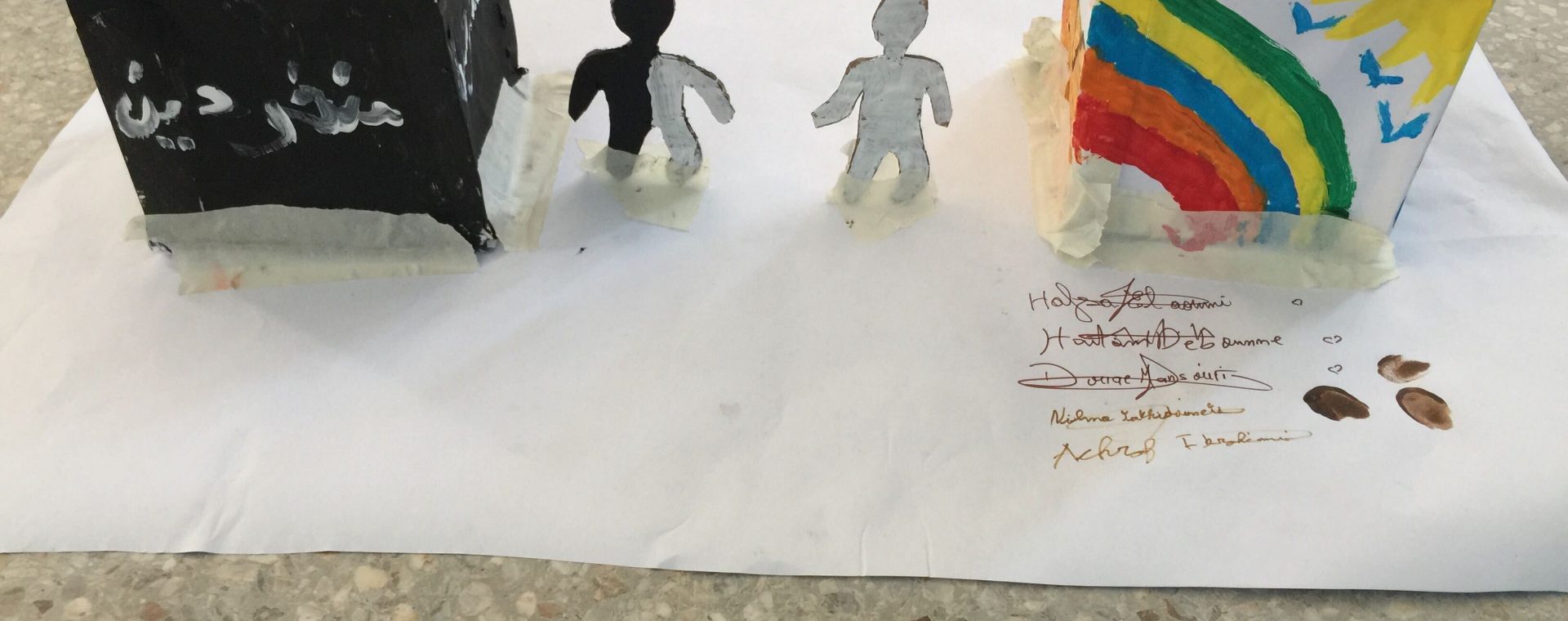
“I learned that in my community I learn”. What Ghizlane, a young woman from the Zouitina (Olive Tree) neighborhood community in Tangier, Morocco, told us was so simple and lucid that one could almost take it for granted. In her words, we felt our understanding of our lived experience, deepen and widen simultaneously. She mirrored to all what we have experienced and witnessed as Tamkeen community facilitators and community members for over 10 years. That short sentence talks about the story of her growing sense of belonging to her community. It seamlessly expresses her awareness that she learned with her community “to be a community” and how its emerging ecology of trust, unconditional love, reciprocity and recognition, fosters learning. It effortlessly infers that she and her fellow community members have learned that they can choose what they want to learn; “violence was in our community but so was love, and we learned to express the love”. The community chose to “learn itself”, to learn how to learn, to co-create the conditions for learning, and to co-reflect that learning into a growing awareness of its choice to learn. Ghizlane was not allowed to finish her studies. She saw, at 11 years old, the doors to learning close with the imposed responsibility to take care of her younger siblings. Together with her neighborhood community, she learned that the door was never locked “I took off the blanket that suffocated me…”, and she adds “… life is beautiful; it is not like it was described to me”. Ghizlane became the author and the actor of, beyond a learning journey, her life. That process mutually arised with her community becoming a learning community. That becoming, further unfolded with the community seeing itself in the mirror of other communities. When members of surrounding neighborhoods said, “We want to be like you…”, “This model is what we want in our neighborhood, more than a thought it is a feeling…” to the youth of Zouitina they answered with an invitation to a co-created process of inquiry, learning and growing understanding rooted in trust in our human potential and unconditional love: “we will share with you our process but you will do it your own way…”
“We cannot be next to a river and collect the water by the spoonful”, told us the new director of the relatively newly built primary school of 1200 students after his week of immersion in Ghizlane’s community’s dynamic. It was his way to talk about the thirst of a dry garden called school in contrast to the flowing life he discovered surrounding the school. His students had invited him to their community house “Dar Maarifa”. The youth shared their co-created community initiatives and the innovative pedagogical models that had emerged. The mothers told the community’s stories, their dreams and offered homemade cakes to all. “How can we make the school become Dar Maarifa?” asked the director to the children that surrounded him in Dar Maarifa. That question almost had the effect of a magic wand. At once, the school transformed in the eyes of the children of the community as the community transformed in the eyes of the director. The education system provincial and regional governance bodies facilitated the emergence of the answer by “letting things grow” and by opening up, with their trust, a new field of possibility. Tamkeen facilitated this self-facilitated, co-created process of an emergent social ecosystem that we call a community-based learning ecosystem. The community no longer was experienced as a neighborhood but a field of neighborhoods and schools co-facilitating and co-creating the conditions for their co-flourishing.
We are witnessing, as Tamkeen community facilitators how the school, the sook (local market), the streets, the houses, and gradually the governmental social infrastructures are becoming Dar Maarifa; a place where all have their place, a place where freedom and imagination run together and live the future in the present, a place where the language spoken is the language of love, compassion, and understanding. “We learned from the children and adolescents who threw stones at the door of Dar Maarifa that one day they will no longer throw them. We learned to open the door when pressure told us to close it”, recalls in wonder Fatima as she realizes how her words speak the subtle interplay between emergence and dissolvence.
We also experience how when the streams of the different community-based learning ecosystems we are co-facilitating (in different geographical areas and societal systems) meet in the confluence of their shared essence, the trust in our human potential and unconditional love, emerges a new community based learning ecosystem with the same essence, a different shape and new metabolic properties. Surprisingly the ease of the co-facilitation and co-creation seems to grow with time and we sense that it is because we took the time to live the experience as it is. No forcing, no nudging, no pushing, just trusting in the epistemic humility of our growing understanding and realizing that we are all the gardeners and the garden.


